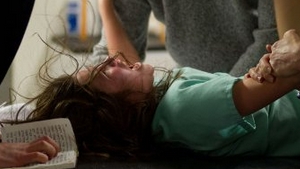 Good news, horror fans: The Possession contains fifteen minutes of a solid Sam Raimi flick. There’s bad news, of course, and that’s that those minutes find their home in the climax, which is preceded by a mixed bag of demonic possession tropes brought to us by Danish filmmaker Ole Bornedal. The Possession finds itself in an uncomfortable place where it reminds us why Raimi is such a treasure to the horror genre, but for reasons that aren’t necessarily good; when the heavily Raimi-influenced climax outshines the entirety of the rest of Bornedal’s film, it’s something of a disservice to the rest of the picture, a possess-by-numbers yarn inspired by a very real and allegedly very spooky object known as a dybbuk box, a cabinet meant to contain a malicious spirit.
Good news, horror fans: The Possession contains fifteen minutes of a solid Sam Raimi flick. There’s bad news, of course, and that’s that those minutes find their home in the climax, which is preceded by a mixed bag of demonic possession tropes brought to us by Danish filmmaker Ole Bornedal. The Possession finds itself in an uncomfortable place where it reminds us why Raimi is such a treasure to the horror genre, but for reasons that aren’t necessarily good; when the heavily Raimi-influenced climax outshines the entirety of the rest of Bornedal’s film, it’s something of a disservice to the rest of the picture, a possess-by-numbers yarn inspired by a very real and allegedly very spooky object known as a dybbuk box, a cabinet meant to contain a malicious spirit.
Bornedal’s film sees this footlocker full of evil find its way into the hands of Em Brenek (Natasha Calis), a teenage girl dealing with fallout from the 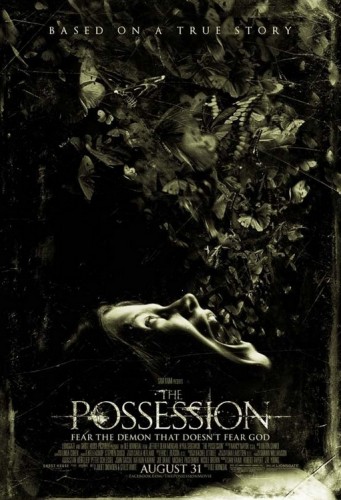 divorce of her parents, Clyde (Jeffrey Dean Morgan) and Stephanie (Kyra Sedgwick). In truth, Em is handling the split better than can reasonably be expected, but then the dybbuk box comes into her life to serve as a metaphor for how divorce can tear a family apart. Naturally, Em does what any other inquisitive youth would do when presented with an ornate box adorned with Hebrew carvings: she swiftly figures out how to open it. Poor form, young lady, though the box is so tantalizingly creepy that I can’t in good conscience say I wouldn’t take a peek inside myself.
divorce of her parents, Clyde (Jeffrey Dean Morgan) and Stephanie (Kyra Sedgwick). In truth, Em is handling the split better than can reasonably be expected, but then the dybbuk box comes into her life to serve as a metaphor for how divorce can tear a family apart. Naturally, Em does what any other inquisitive youth would do when presented with an ornate box adorned with Hebrew carvings: she swiftly figures out how to open it. Poor form, young lady, though the box is so tantalizingly creepy that I can’t in good conscience say I wouldn’t take a peek inside myself.
If you’ve seen films ranging from The Exorcist to Drag Me to Hell, you already know what happens next: bouts of unexpected, out of the blue scariness. Em starts behaving erratically, her teacher dies in a violently mysterious way, and swarms of moths appear inside Clyde’s new bachelor residence in the middle of Nowhere, New York. Clyde knows something bizarre is up; Stephanie thinks Clyde’s just a terrible absentee father, and that Em’s actions are being informed by the stress of the divorce. That’s the film’s big central allegory, of course, but it’s handled with an obvious and uneven hand that paints Sedgwick’s mother as an oblivious shrew while Morgan’s cool, sad dad gets all the glory in the role of the person who “gets it”.
Maybe that’s unfair. What divorced parent would presume that their child’s uncharacteristic outbursts of anger and violence had to do with anything but the emotional pain of familial separation? Clyde only suspects something greater at work because Em speaks to him obsessively about the box and her new imaginary friend. When Stephanie claims Em tells her everything, we know that someone isn’t telling the truth– either mother or daughter (or, in fairness, the dybbuk itself). Perhaps it isn’t Stephanie’s fault that she’s clueless.
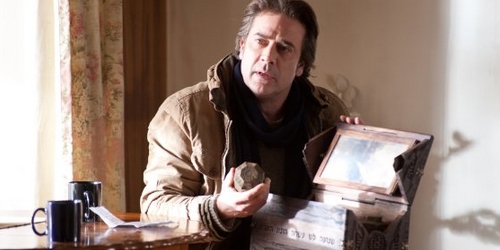
But The Possession has very little of value to say about this scenario, and that’s the film’s real downfall. At its best, horror cinema uses its rogues gallery of monsters, spirits, and killers to prop up examinations of social or political issues, but Bornedal doesn’t really offer up much more here than an easy answer to the film’s central conundrum. The failure lies in the story’s bones; as we meet Em, she’s shown to be mostly well-adjusted to her family’s circumstances outside of the naive hope she holds onto that Clyde and Stephanie will reconcile and get back together. Everything that follows can be blamed on the dybbuk box*; any moments the Breneks spend wondering if they’ve screwed up their kids are undermined by the simple truth that when Em lashes out, she’s literally not in control. And as a result, that previously mentioned metaphor doesn’t wash.
The bigger flaw here may well be the fact that The Possession just isn’t scary. Nevermind that Bornedal blatantly telegraphs his horror beats; he simply has no idea how to make his audience jump. If his knowledge of inducing fear matched his craftsmanship, The Possession would be an easy contender for any “top X scariest movies” list for 2012, but he brings a flat, rote sensibility to the lion’s share of his frights. It’s not until that climax that The Possession really gets scary, and giving credit where it’s due, Bornedal infuses his finale with a plethora of scares well worth savoring. If only he’d figured out how to make the rest of his film one capable of giving us the heebie jeebies.
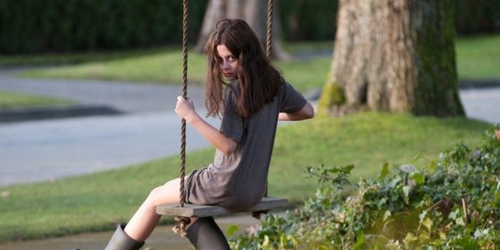
He does know how to make a film look great, though, and if The Possession has some issues with cutting– it never once satisfyingly lingers– it’s very lovely to behold. It’s also acted convincingly, so much so that it’s hard not to walk out wondering why other horror movies can’t be constructed this well and boast performances this good. Notably, Morgan is likely to get some richly deserved praise for making Clyde, an earnest type who mostly tries his hardest at being a great dad, feel alive and beaten down, but it’s Natasha Calis who proves to be the revelation here as Em. While her interactions with Morgan create an overwhelmingly convincing portrait of father and daughter, it’s her moments of disbelieving terror as the dybbuk’s hold over her grows stronger and stronger that truly make her stand out.
G-S-T RULING:
Unfortunately they can’t save The Possession, though they do add a bit of flavor to an otherwise standard story. Bornedal attempts to buck formula by swapping out Catholicism for Orthodox Judaism, but by the time Clyde travels to Brooklyn to appeal to rabbis for help (including Hasidic reggae singer Matisyahu, who also avails himself well here), it’s too little too late. It’s easy to appreciate the artistic touches and acting here, but even easier to awe at how empty the film ultimately is.
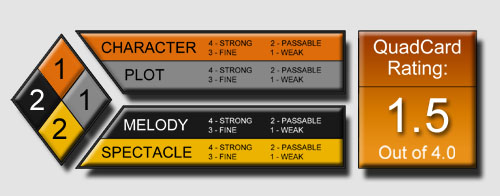
**Or, honestly, on Clyde, who purchases the box for Em without even thinking about it.
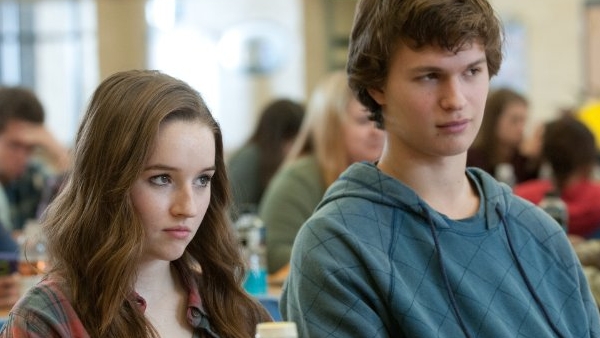
7 Comments
Grady May
Glad you took one for the team on this one. I had my doubts after watching the trailer.
RidgeRacer4
Well at least these’s some value in the film and while I was interested before I read the review I’m still planning to give this a shot…at some point. Fine review Andrew!
Andrew Crump
Hey, I’m happy to leap in front of a train for you guys. No problem. I’m just blown away that decades after The Exorcist, people still don’t understand what makes that film work so well.
CastorTroy
Horror movies being not scary. I guess that’s an anemic issue these days. It takes a lot more to truly terrify people than loud noises and sudden jumps.
Andrew Crump
It takes tension and atmosphere, too, and build-up. Jump scares can be fine if they’re earned. For my part I’m also blown away at how unscary the horror films I’ve seen this year have been; other than V/H/S and Cabin in the Woods (which itself isn’t that scary by comparison, but remains a far better horror film), I haven’t really been all that overwhelmed with fear at the cinema. Yet.
cablebfg
Great review, Andrew. I really can’t add much more to what you said so I’m glad I backed out of reviewing it.
Andrew Crump
Thanks, Bill– glad to have stepped up. The only other thing I can think of that’s worth saying here is that The Possession really doesn’t get what makes a film like The Exorcist click, but I’ve actually already made that point in the comments alone!